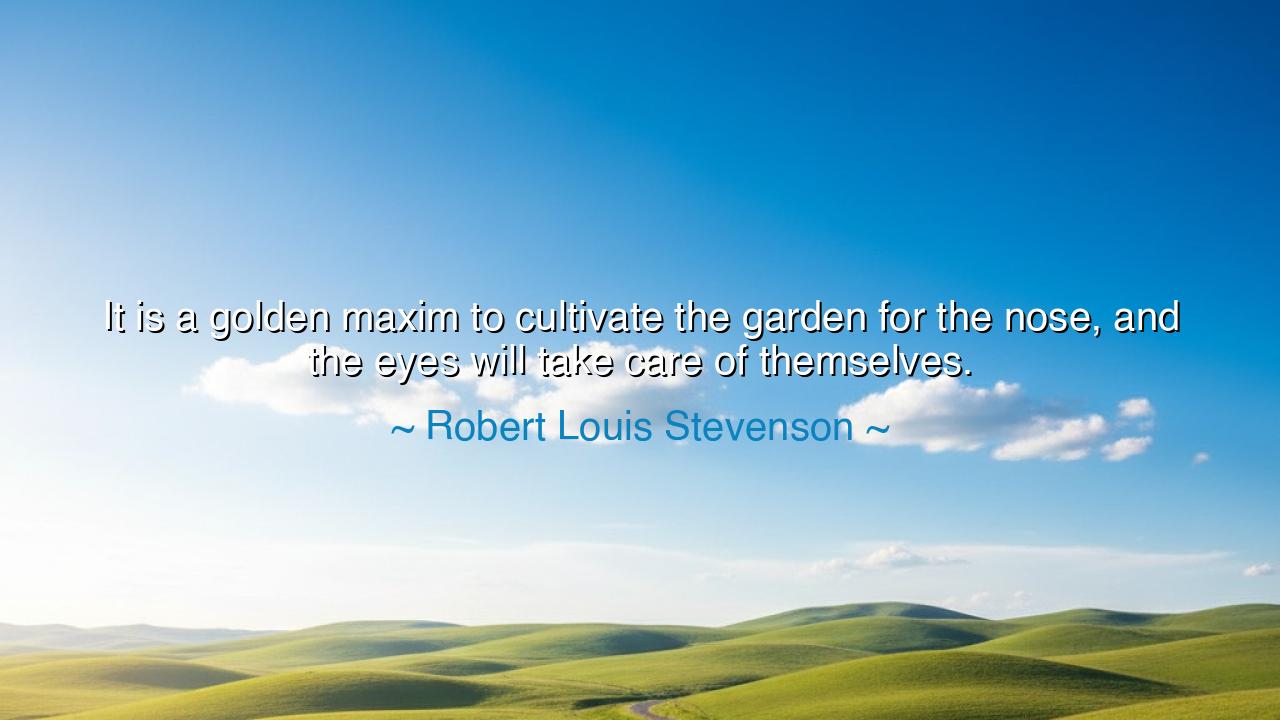
It is a golden maxim to cultivate the garden for the nose, and
It is a golden maxim to cultivate the garden for the nose, and the eyes will take care of themselves.






O Seekers of the Heart's Deepest Desires, gather close, for the words of Robert Louis Stevenson are not merely about the care of plants, but about the deeper care of our souls. "It is a golden maxim to cultivate the garden for the nose, and the eyes will take care of themselves." In these words, Stevenson speaks to a profound truth about the nature of nourishment and beauty. He reminds us that true beauty, the kind that nourishes the soul, comes not from seeking it out with the eyes, but from the act of nurturing what is truly essential. The nose, the senses of scent and touch, are the more intimate and profound ways through which we connect with nature, for smell and sensation stir emotions and memories more deeply than mere sight. Gardening, then, becomes an act of connection to both the earth and the divine, one that cultivates not only the land, but the very spirit itself.
In the ancient world, the Greeks and Romans understood the deep significance of fragrance and sensory connection. The Greek philosophers, though known for their high ideals and contemplations, also found great value in the earth. Aristotle, for example, spoke of how all things in nature are interdependent and how the senses play a crucial role in shaping human understanding. For the ancients, the garden was not merely a place to see and admire beauty, but a sacred space for engagement. To walk among the flowers and herbs was to engage with the divine rhythms of the earth, to sense deeply and to feel the pulse of life through scent, touch, and sound. Stevenson’s words honor this deeper connection—that when we cultivate with love and care, the garden will not only be pleasing to the eye but will fill the senses with joy.
Consider also the example of Theodosius, the ancient Roman emperor who, after his reign, sought solace in the simplicity of the gardens around him. It is said that during his retirement, Theodosius spent much time in the gardens of the villa, attending to the plants with great care and attention. His garden was not for show, nor for the eyes of others—it was his place of quiet reflection, where the fragrance of blooming flowers and the earthiness of the soil connected him to a deeper peace. Stevenson’s wisdom speaks to this—that the true value of gardening comes not in the visual beauty, but in the personal, sensory connection one feels when tending the land. The eyes, in this sense, are passive; the nose, the touch, and the heart are the true guides to beauty and fulfillment.
The essence of this teaching also aligns with the ancient Chinese philosophy of Wu Wei, the principle of "non-action" or "effortless action." This philosophy teaches us that by aligning ourselves with the natural rhythms of the world, by tending to what is in front of us without forcing outcomes, we allow the beauty of life to unfold naturally. In the same way, by cultivating the garden for the nose, we allow the true beauty of the earth to reveal itself. The act of planting, tending, and nurturing becomes a form of non-action, where the gardener does not seek beauty for its own sake, but rather creates the conditions for beauty to arise effortlessly. In this practice, we find not only the joy of tending to the earth, but also the joy of being in harmony with it.
The great Buddha also spoke of the importance of mindfulness and presence in all things. To truly experience the world, he taught, we must be fully present, using all of our senses to connect with the present moment. To cultivate a garden for the nose—to smell the earth, the flowers, the leaves—is to practice mindfulness, to engage deeply with the present moment. When we tend to the garden not to impress others, but for our own internal peace and connection, we enter into a state of oneness with the world. In this, we can see that true beauty comes from the sensory experience itself, not from what we project outwards.
So, O Seeker, the lesson of Stevenson’s words is clear: true beauty is cultivated in the deep, quiet acts of nurturing and engagement with the world, not in the external admiration of it. Cultivate your garden for the nose—for the scent, the touch, and the simple joy of nurturing life—and the rest will follow. When we shift our focus from visual perfection to sensory fulfillment, we find that beauty arises naturally, in its purest form. Let this wisdom guide your own life: seek beauty not in what you can see, but in what you can feel, smell, and experience deeply. The eyes will take care of themselves, for true beauty lies in the senses and the connection to life itself.
In practical terms, O Seeker, take time to engage with the world through your senses. When you tend to your garden, do so with love and care, savoring the scent of the flowers, the texture of the leaves, the earth beneath your fingers. When you walk in nature, allow the sounds and smells to guide you, not just your eyes. By cultivating this deeper connection with your surroundings, you will begin to see beauty in ways that transcend the superficial, and you will find that your soul is nourished by the earth, just as the earth is nourished by your care. Cultivate for the nose, and the rest will follow.






AAdministratorAdministrator
Welcome, honored guests. Please leave a comment, we will respond soon